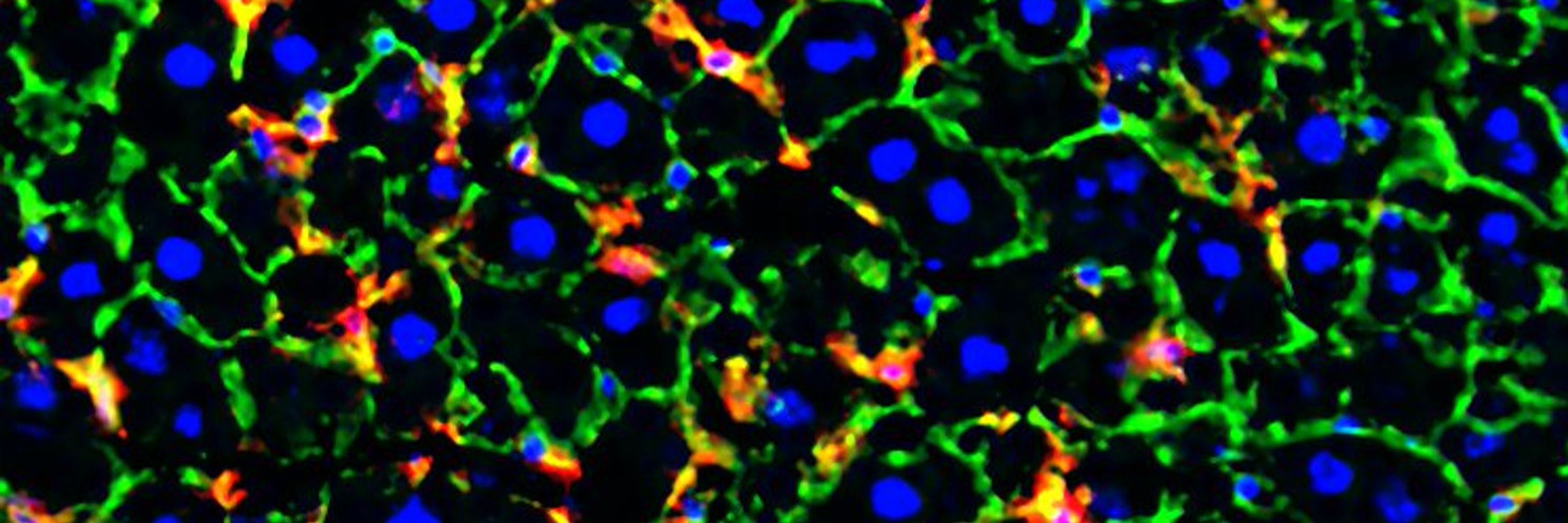
Joe Wanford
@jwanford.bsky.social
Group leader and Wellcome Trust Career Development Fellow at King's College London. Using comparative genomics, microbiology and innate immunology to study Klebsiella virulence. Foodie and below average footballer.
Pinned
Joe Wanford
@jwanford.bsky.social
· Sep 15

Simple Sequence Repeats Mediate Phase Variation of the Mucoid Phenotype in Hypervirulent Klebsiella pneumoniae
Hypervirulent Klebsiella pneumoniae (HVKp) express a thick mucoid capsular polysaccharide which is essential for virulence and survival in the bloodstream but inhibits epithelial adhesion and invasion...
www.biorxiv.org
🎉 Delighted to share the first pre-print from my lab where we demonstrate that intergenic DNA repeats mediate phase variation of the mucoid phenotype in hypervirulent Klebsiella pneumoniae: www.biorxiv.org/content/10.1... #klebclub
Reposted by Joe Wanford
A Novel Technique to Characterize Klebsiella pneumoniae Populations Indicates that Mono-Colonization is Associated with Risk of Infection https://www.biorxiv.org/content/10.1101/2025.11.05.686704v1
November 6, 2025 at 3:17 AM
A Novel Technique to Characterize Klebsiella pneumoniae Populations Indicates that Mono-Colonization is Associated with Risk of Infection https://www.biorxiv.org/content/10.1101/2025.11.05.686704v1
Reposted by Joe Wanford
Reposted by Joe Wanford
Phages use contingency loci as a bet-hedging strategy https://www.biorxiv.org/content/10.1101/2025.10.21.683753v1
October 22, 2025 at 3:16 AM
Phages use contingency loci as a bet-hedging strategy https://www.biorxiv.org/content/10.1101/2025.10.21.683753v1
Reposted by Joe Wanford
Enhanced virulence and stress tolerance are signatures of epidemiologically successful Shigella sonnei
@sydneylmiles.bsky.social @katholt.bsky.social
🙏to transformative collaborative effort
www.nature.com/articles/s41...
@sydneylmiles.bsky.social @katholt.bsky.social
🙏to transformative collaborative effort
www.nature.com/articles/s41...
October 13, 2025 at 9:48 PM
Enhanced virulence and stress tolerance are signatures of epidemiologically successful Shigella sonnei
@sydneylmiles.bsky.social @katholt.bsky.social
🙏to transformative collaborative effort
www.nature.com/articles/s41...
@sydneylmiles.bsky.social @katholt.bsky.social
🙏to transformative collaborative effort
www.nature.com/articles/s41...
Great opportunity in a great lab!
Job opportunity in my lab! We're looking for a post-doc to come join us for an exciting project exploring the evolution of #AMR and #hypervirulence in #klebsiella. Please share!! @unibirmingham.bsky.social Details: www.jobs.ac.uk/job/DOV067/r...

Research Fellow at University of Birmingham
Apply now for the Research Fellow role on jobs.ac.uk - the leading job board for higher education jobs. View details.
www.jobs.ac.uk
October 2, 2025 at 3:58 PM
Great opportunity in a great lab!
🎉 Delighted to share the first pre-print from my lab where we demonstrate that intergenic DNA repeats mediate phase variation of the mucoid phenotype in hypervirulent Klebsiella pneumoniae: www.biorxiv.org/content/10.1... #klebclub

Simple Sequence Repeats Mediate Phase Variation of the Mucoid Phenotype in Hypervirulent Klebsiella pneumoniae
Hypervirulent Klebsiella pneumoniae (HVKp) express a thick mucoid capsular polysaccharide which is essential for virulence and survival in the bloodstream but inhibits epithelial adhesion and invasion...
www.biorxiv.org
September 15, 2025 at 9:51 AM
🎉 Delighted to share the first pre-print from my lab where we demonstrate that intergenic DNA repeats mediate phase variation of the mucoid phenotype in hypervirulent Klebsiella pneumoniae: www.biorxiv.org/content/10.1... #klebclub
Reposted by Joe Wanford
How complex functions, with important physiological and evolutionary impacts get repeatedly and efficiently transferred across genomes?
That’s what we explored using one of the fastest-evolving loci in Bacteria: the capsule locus.
The paper: www.biorxiv.org/content/10.1...
Thread👇
That’s what we explored using one of the fastest-evolving loci in Bacteria: the capsule locus.
The paper: www.biorxiv.org/content/10.1...
Thread👇

Serotype swapping in Klebsiella spp. by plug-and-play
Understanding how complex, multi-gene systems evolve and function across genetic backgrounds is a central question in molecular evolution. While such systems often impose costs through epistatic inter...
www.biorxiv.org
September 10, 2025 at 8:17 AM
How complex functions, with important physiological and evolutionary impacts get repeatedly and efficiently transferred across genomes?
That’s what we explored using one of the fastest-evolving loci in Bacteria: the capsule locus.
The paper: www.biorxiv.org/content/10.1...
Thread👇
That’s what we explored using one of the fastest-evolving loci in Bacteria: the capsule locus.
The paper: www.biorxiv.org/content/10.1...
Thread👇
🚨 Job alert 🚨
I’m recruiting two postdoctoral research associates to join my lab at KCL to study how #Klebsiella pneumoniae regulates virulence factor expression during infection! #klebclub
Mol Micro: tinyurl.com/mtrwtx5e
Infection: tinyurl.com/2s3u8ca2
Deadline: 21st September.
I’m recruiting two postdoctoral research associates to join my lab at KCL to study how #Klebsiella pneumoniae regulates virulence factor expression during infection! #klebclub
Mol Micro: tinyurl.com/mtrwtx5e
Infection: tinyurl.com/2s3u8ca2
Deadline: 21st September.
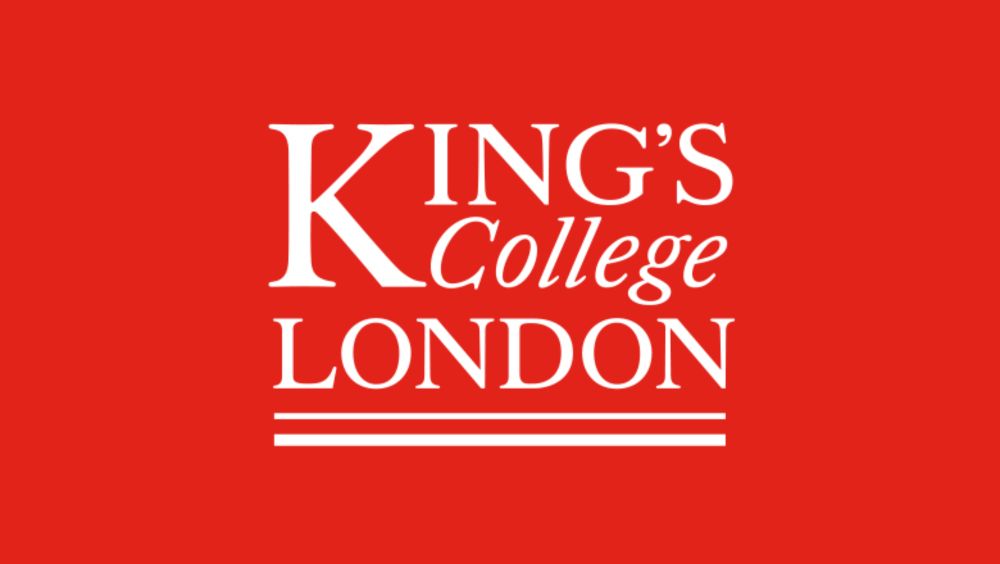
Postdoctoral Research Associate in Molecular Microbiology
www.kcl.ac.uk
August 26, 2025 at 2:40 PM
🚨 Job alert 🚨
I’m recruiting two postdoctoral research associates to join my lab at KCL to study how #Klebsiella pneumoniae regulates virulence factor expression during infection! #klebclub
Mol Micro: tinyurl.com/mtrwtx5e
Infection: tinyurl.com/2s3u8ca2
Deadline: 21st September.
I’m recruiting two postdoctoral research associates to join my lab at KCL to study how #Klebsiella pneumoniae regulates virulence factor expression during infection! #klebclub
Mol Micro: tinyurl.com/mtrwtx5e
Infection: tinyurl.com/2s3u8ca2
Deadline: 21st September.
Now that it’s official, I’m delighted to announce I’ve been awarded a Wellcome Trust Career Development Award to fund my lab’s work on K. pneumoniae pathogenesis for the next 8 years! Very grateful to many fantastic mentors and collaborators who’ve helped throughout this process.
July 29, 2025 at 3:04 PM
Now that it’s official, I’m delighted to announce I’ve been awarded a Wellcome Trust Career Development Award to fund my lab’s work on K. pneumoniae pathogenesis for the next 8 years! Very grateful to many fantastic mentors and collaborators who’ve helped throughout this process.
Reposted by Joe Wanford
Delighted our study (7+ years in the making) is out today in Nature. In a nutshell, 48 hours of antibiotics in week 1 led to impaired vaccine responses up to 15 months later in infants. We show (in-vivo) a probiotic can fix it #microbiome #science #immunology
www.nature.com/articles/s41...
www.nature.com/articles/s41...
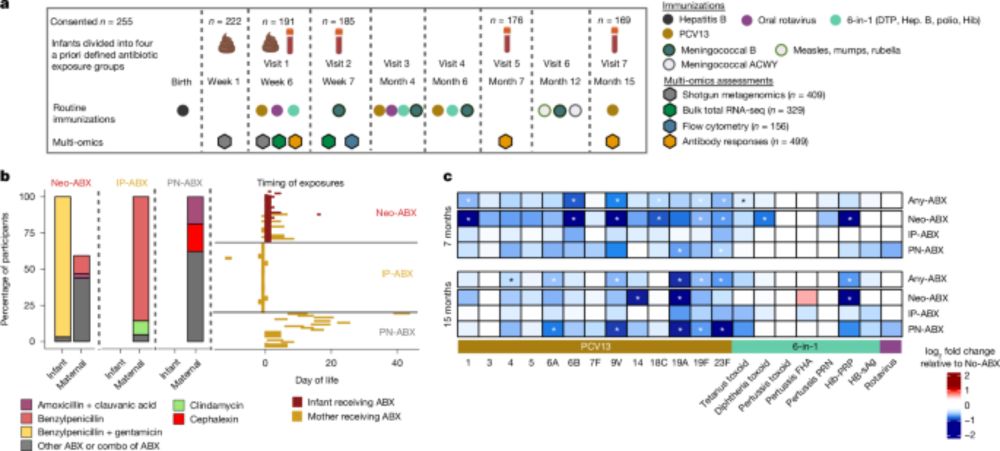
Bifidobacteria support optimal infant vaccine responses - Nature
Neonatal antibiotic use is shown to reduce immune response to infant vaccines, accompanied by reduced abundance of Bifidobacteria in the gut microbiota, with experiments in mice indicating that probio...
www.nature.com
April 2, 2025 at 11:33 PM
Delighted our study (7+ years in the making) is out today in Nature. In a nutshell, 48 hours of antibiotics in week 1 led to impaired vaccine responses up to 15 months later in infants. We show (in-vivo) a probiotic can fix it #microbiome #science #immunology
www.nature.com/articles/s41...
www.nature.com/articles/s41...
Reposted by Joe Wanford
I am recruiting a research assistant. Please send to anyone you know who is interested in gaining more lab experience in host:pathogen interactions of bacterial infections.
www.jobs.cam.ac.uk/job/50738/
www.jobs.cam.ac.uk/job/50738/
Research Assistant - Godlee Group (Fixed Term) - Job Opportunities - University of Cambridge
Research Assistant - Godlee Group (Fixed Term) in the Department of Biochemistry at the University of Cambridge.
www.jobs.cam.ac.uk
March 31, 2025 at 7:38 AM
I am recruiting a research assistant. Please send to anyone you know who is interested in gaining more lab experience in host:pathogen interactions of bacterial infections.
www.jobs.cam.ac.uk/job/50738/
www.jobs.cam.ac.uk/job/50738/
Reposted by Joe Wanford
OUT NOW: Inducible transposon mutagenesis identifies bacterial fitness determinants during infection in mice
#microsky 🧪
www.nature.com/articles/s41...
#microsky 🧪
www.nature.com/articles/s41...
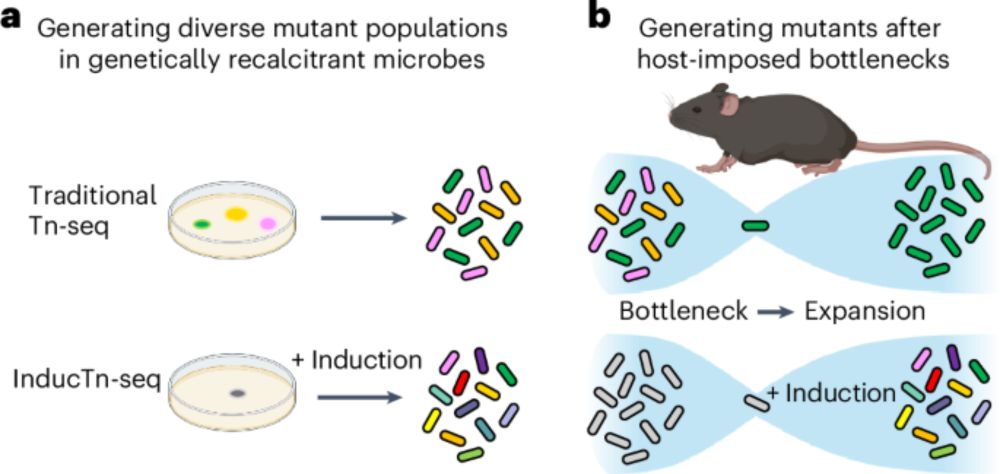
Inducible transposon mutagenesis identifies bacterial fitness determinants during infection in mice - Nature Microbiology
InducTn-seq, a method for inducible mutagenesis followed by transposon insertion site sequencing, enables temporal control of transposition to bypass population bottlenecks and enable the quantificati...
www.nature.com
March 27, 2025 at 4:35 PM
OUT NOW: Inducible transposon mutagenesis identifies bacterial fitness determinants during infection in mice
#microsky 🧪
www.nature.com/articles/s41...
#microsky 🧪
www.nature.com/articles/s41...
Reposted by Joe Wanford
New in Nat Comm
A rapid evolution-tracking system for 𝘒𝘭𝘦𝘣𝘴𝘪𝘦𝘭𝘭𝘢 𝘱𝘯𝘦𝘶𝘮𝘰𝘯𝘪𝘢𝘦 that experimentally tests how this leading MDR threat resists antibiotics and adapts to serum to invade the bloodstream
www.nature.com/articles/s41...
A rapid evolution-tracking system for 𝘒𝘭𝘦𝘣𝘴𝘪𝘦𝘭𝘭𝘢 𝘱𝘯𝘦𝘶𝘮𝘰𝘯𝘪𝘢𝘦 that experimentally tests how this leading MDR threat resists antibiotics and adapts to serum to invade the bloodstream
www.nature.com/articles/s41...
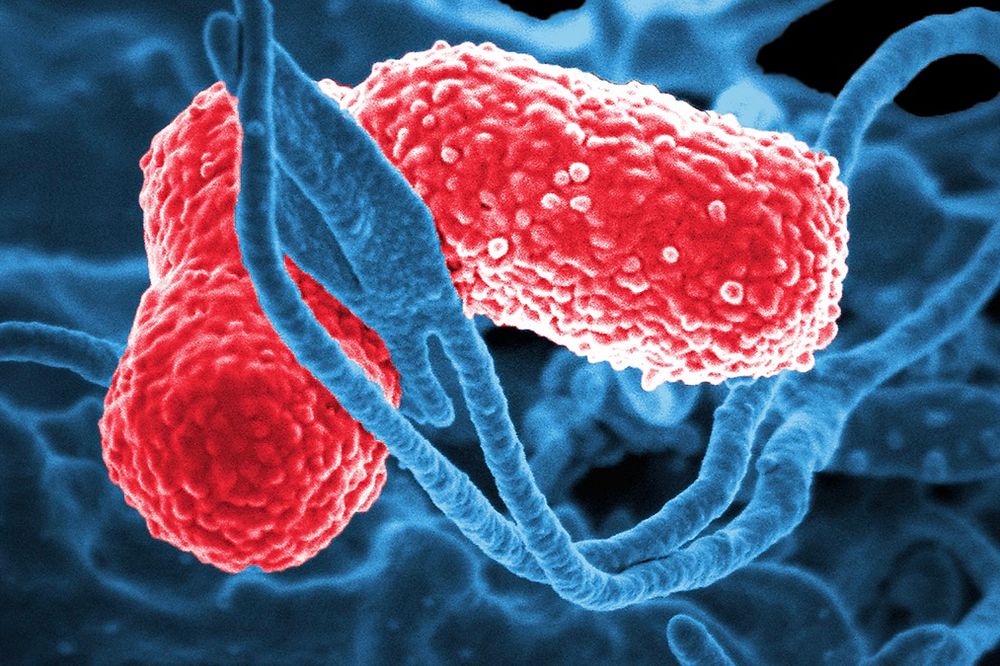
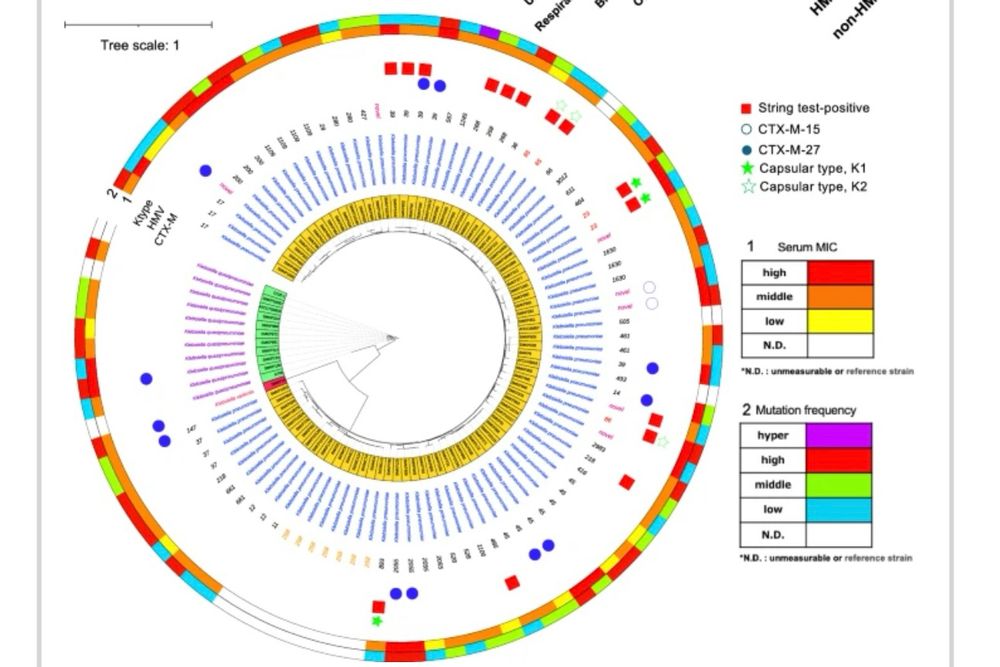
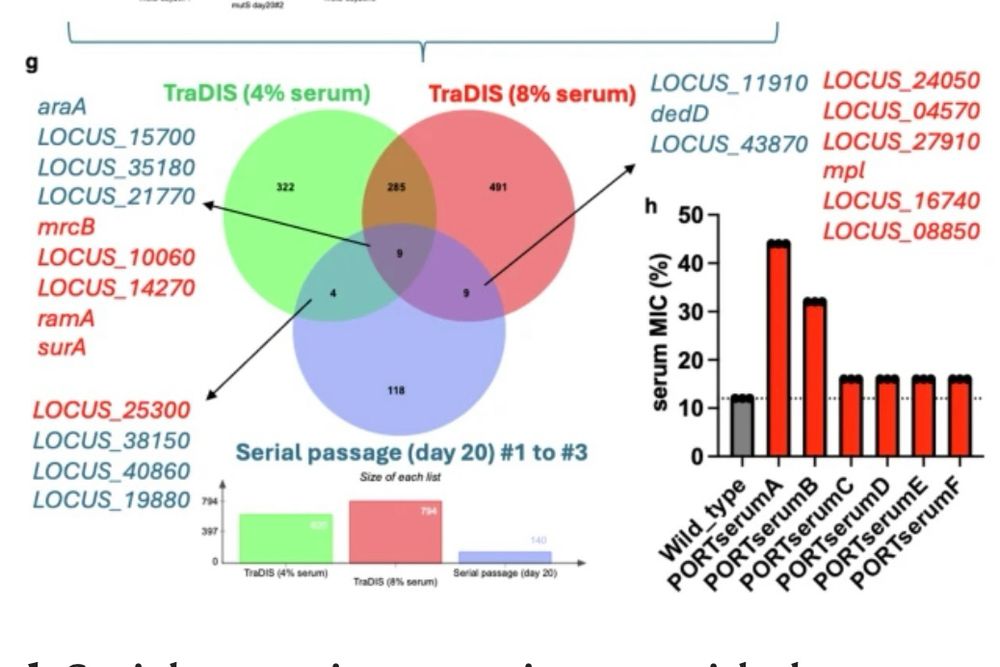
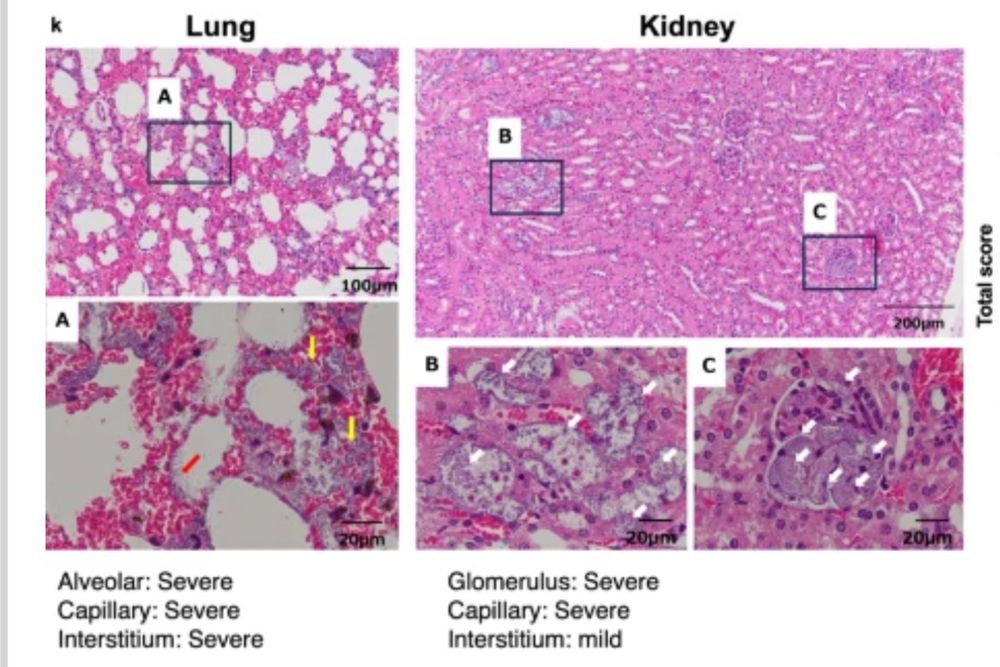
March 26, 2025 at 11:38 AM
New in Nat Comm
A rapid evolution-tracking system for 𝘒𝘭𝘦𝘣𝘴𝘪𝘦𝘭𝘭𝘢 𝘱𝘯𝘦𝘶𝘮𝘰𝘯𝘪𝘢𝘦 that experimentally tests how this leading MDR threat resists antibiotics and adapts to serum to invade the bloodstream
www.nature.com/articles/s41...
A rapid evolution-tracking system for 𝘒𝘭𝘦𝘣𝘴𝘪𝘦𝘭𝘭𝘢 𝘱𝘯𝘦𝘶𝘮𝘰𝘯𝘪𝘢𝘦 that experimentally tests how this leading MDR threat resists antibiotics and adapts to serum to invade the bloodstream
www.nature.com/articles/s41...
Reposted by Joe Wanford
I am very excited to share our latest publication on the effect of systemic #endotoxin on intestinal #microbiota spearheaded by the brilliant Sanne Kroon at the Hardt lab @eth-dbiol.bsky.social @ethzurich.bsky.social @naturecomms.bsky.social
👉🏼 rdcu.be/eelLn
👉🏼 rdcu.be/eelLn
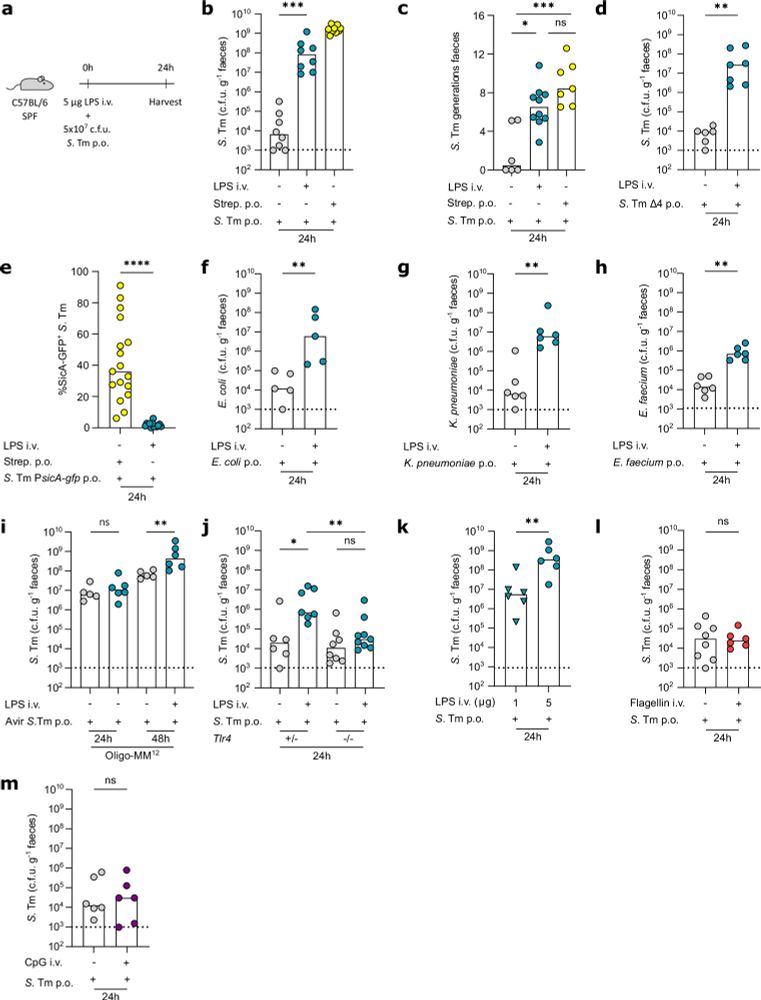
Sublethal systemic LPS in mice enables gut-luminal pathogens to bloom through oxygen species-mediated microbiota inhibition
Nature Communications - Acute systemic immune activation may affect gut-luminal colonisation dynamics. Here, the authors show that LPS exposure in mice elevates gut-luminal oxygen species levels,...
rdcu.be
March 23, 2025 at 9:15 AM
I am very excited to share our latest publication on the effect of systemic #endotoxin on intestinal #microbiota spearheaded by the brilliant Sanne Kroon at the Hardt lab @eth-dbiol.bsky.social @ethzurich.bsky.social @naturecomms.bsky.social
👉🏼 rdcu.be/eelLn
👉🏼 rdcu.be/eelLn
🚨 Join us at King's College London for all things cellular microbiology! Super friendly meeting with cool science and great opportunity for ECRs to present their work!
Strange sights in central London!
🚨 UK Cell Micro 2025 is here! 🚨
📅 2nd-3rd June 2025
📍 King’s College London
Join us for fun science, networking, and a rooftop social! 🌇🎉
💡 Submit your abstract by 10th April
ukcellmicro.org
🚨 UK Cell Micro 2025 is here! 🚨
📅 2nd-3rd June 2025
📍 King’s College London
Join us for fun science, networking, and a rooftop social! 🌇🎉
💡 Submit your abstract by 10th April
ukcellmicro.org
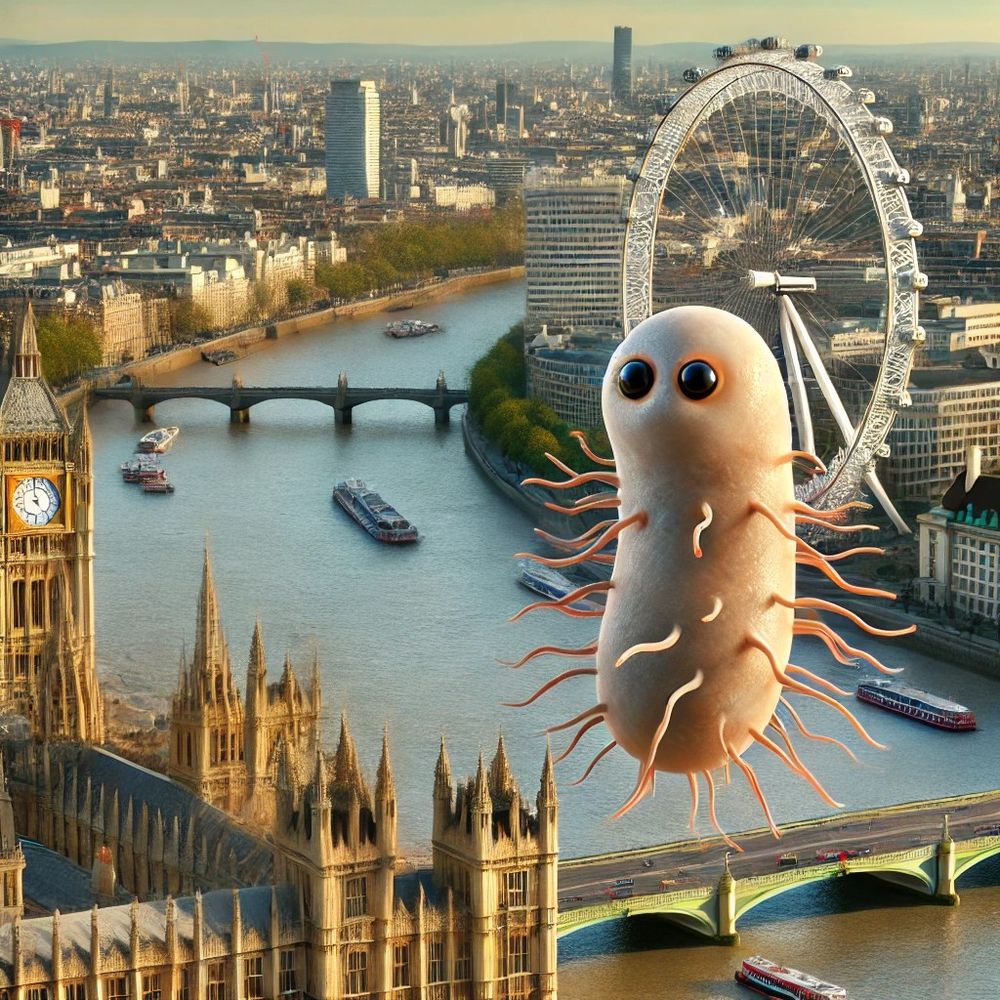
March 20, 2025 at 8:11 AM
🚨 Join us at King's College London for all things cellular microbiology! Super friendly meeting with cool science and great opportunity for ECRs to present their work!
Reposted by Joe Wanford
What do Pablo Picasso and Charles Janeway have in common? Both were interested in patterns of life. Janeway was focused on pathogen associated molecular patterns (PAMPs) that are detected by our immune system. But what are these patterns he refers to?
March 8, 2025 at 2:39 PM
What do Pablo Picasso and Charles Janeway have in common? Both were interested in patterns of life. Janeway was focused on pathogen associated molecular patterns (PAMPs) that are detected by our immune system. But what are these patterns he refers to?
Reposted by Joe Wanford
New paper alert! Thoughtful review of phase variation, including current controversies. @microbiologysociety.org www.microbiologyresearch.org/content/jour...

100+ years of phase variation: the premier bacterial bet-hedging phenomenon
Stochastic, reversible switches in the expression of Salmonella flagella variants were first described by Andrewes in 1922. Termed phase variation (PV), subsequent research found that this phenomenon ...
www.microbiologyresearch.org
February 28, 2025 at 8:47 AM
New paper alert! Thoughtful review of phase variation, including current controversies. @microbiologysociety.org www.microbiologyresearch.org/content/jour...
Reposted by Joe Wanford
Nature research paper: Macrophages recycle phagocytosed bacteria to fuel immunometabolic responses
https://go.nature.com/3XmyOPD
https://go.nature.com/3XmyOPD
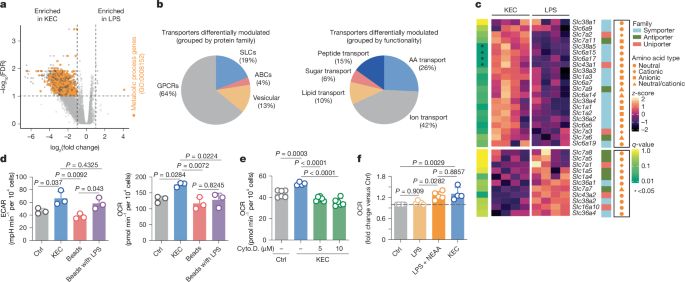
Macrophages recycle phagocytosed bacteria to fuel immunometabolic responses - Nature
Phagocytosed bacteria can serve as an alternative nutrient source for macrophages, influencing their metabolic and immune responses through the recycling of microbial components, with the process regulated by nutrient-sensing mechanisms and bacterial viability.
go.nature.com
February 27, 2025 at 4:04 PM
Nature research paper: Macrophages recycle phagocytosed bacteria to fuel immunometabolic responses
https://go.nature.com/3XmyOPD
https://go.nature.com/3XmyOPD
Reposted by Joe Wanford
Happy to share a preprint from the Angelo lab many years in the making. Read on for a saga of multiplexed imaging, immunometabolism, and TB granulomas with some fun side quests into the realms of geographical information sciences and transcriptomics… (1/20) doi.org/10.1101/2025...

The immunometabolic topography of tuberculosis granulomas governs cellular organization and bacterial control
Despite being heavily infiltrated by immune cells, tuberculosis (TB) granulomas often subvert the host response to Mycobacterium tuberculosis (Mtb) infection and support bacterial persistence. We prev...
doi.org
February 24, 2025 at 10:16 PM
Happy to share a preprint from the Angelo lab many years in the making. Read on for a saga of multiplexed imaging, immunometabolism, and TB granulomas with some fun side quests into the realms of geographical information sciences and transcriptomics… (1/20) doi.org/10.1101/2025...
Reposted by Joe Wanford
Base-modified nucleotides mediate immune signaling in bacteria www.science.org/doi/abs/10.1... #jcampubs
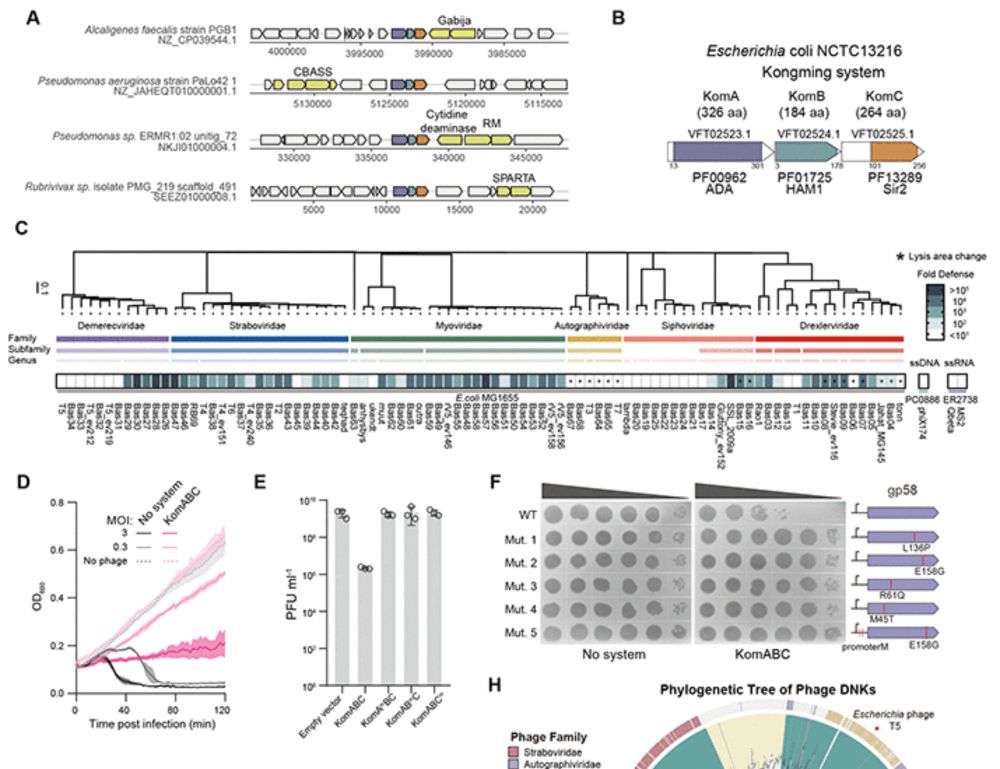
Base-modified nucleotides mediate immune signaling in bacteria
Signaling from pathogen sensing to effector activation is a fundamental principle of cellular immunity. While cyclic (oligo)nucleotides have emerged as key signaling molecules, the existence of other ...
www.science.org
February 21, 2025 at 12:58 AM
Base-modified nucleotides mediate immune signaling in bacteria www.science.org/doi/abs/10.1... #jcampubs
Reposted by Joe Wanford
Save the date:2/3 June: UK Cellular Micro is coming back to London! We have two amazing keynotes and all other talks will be selected from abstracts. Submissions opening soon
🚀 Join us at the UK Cellular Microbiology meeting at KCL on 2nd-3rd June 2025! 🌟
Registrations and abstract submissions opening soon!
Don't miss this great opportunity to share research updates and network!
#UKCellMicro
Registrations and abstract submissions opening soon!
Don't miss this great opportunity to share research updates and network!
#UKCellMicro
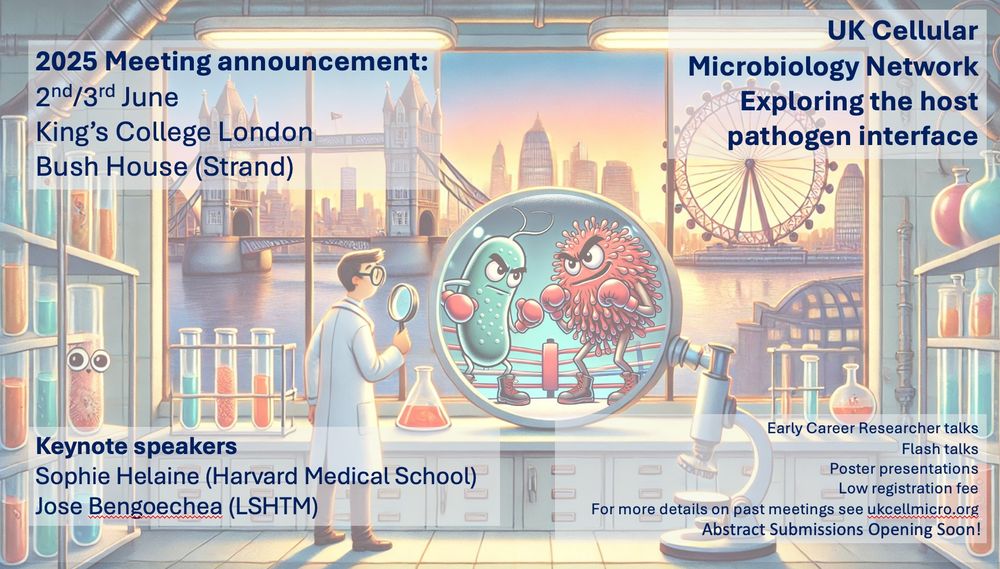
February 17, 2025 at 5:55 PM
Save the date:2/3 June: UK Cellular Micro is coming back to London! We have two amazing keynotes and all other talks will be selected from abstracts. Submissions opening soon
Reposted by Joe Wanford
Delighted to share our new study. A collaboration with the Thurlow lab. Antibiotic resistance rapidly emerges and thrives in diabetic mice. A worrying coming together of two major and growing health problems worldwide www.science.org/doi/10.1126/...
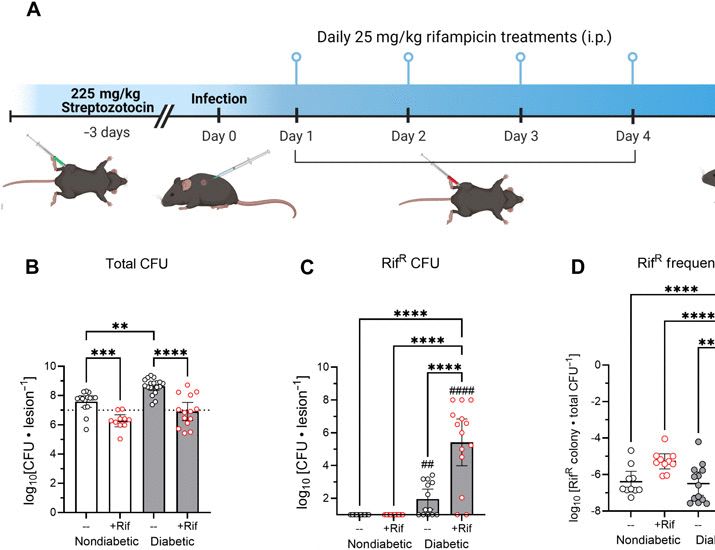
Diabetes potentiates the emergence and expansion of antibiotic resistance
Diabetic infections are a reservoir for the emergence and proliferation of antibiotic resistance in Staphylococcus aureus.
www.science.org
February 13, 2025 at 11:48 AM
Delighted to share our new study. A collaboration with the Thurlow lab. Antibiotic resistance rapidly emerges and thrives in diabetic mice. A worrying coming together of two major and growing health problems worldwide www.science.org/doi/10.1126/...
Reposted by Joe Wanford
New research article
Antibody responses in #Klebsiella pneumoniae bloodstream infection: a prospective cohort study
www.thelancet.com/journals/lan...
#IDSky #ClinMicro #BSI #OpenAccess #OA
Antibody responses in #Klebsiella pneumoniae bloodstream infection: a prospective cohort study
www.thelancet.com/journals/lan...
#IDSky #ClinMicro #BSI #OpenAccess #OA
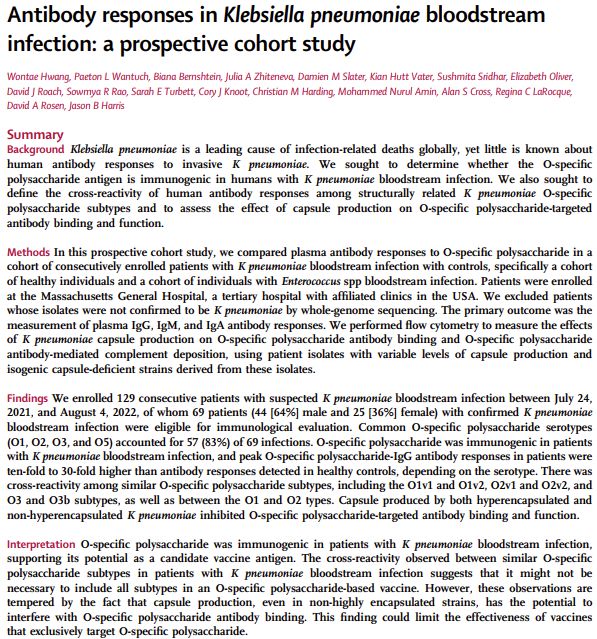
February 11, 2025 at 2:46 PM
New research article
Antibody responses in #Klebsiella pneumoniae bloodstream infection: a prospective cohort study
www.thelancet.com/journals/lan...
#IDSky #ClinMicro #BSI #OpenAccess #OA
Antibody responses in #Klebsiella pneumoniae bloodstream infection: a prospective cohort study
www.thelancet.com/journals/lan...
#IDSky #ClinMicro #BSI #OpenAccess #OA
Reposted by Joe Wanford
Super excited to finally present the preprint to accompany Kaptive 3 which we released last year!
Big thanks to coauthors @kelwyres.bsky.social, @katholt.bsky.social, @genomarit.bsky.social and Iren Löhr.
Here's what we did to improve in silico antigen typing 👇🧵
www.biorxiv.org/content/10.1...
Big thanks to coauthors @kelwyres.bsky.social, @katholt.bsky.social, @genomarit.bsky.social and Iren Löhr.
Here's what we did to improve in silico antigen typing 👇🧵
www.biorxiv.org/content/10.1...

Fast and Accurate in silico Antigen Typing with Kaptive 3
Surface polysaccharides are common antigens in priority pathogens and therefore attractive targets for novel control strategies such as vaccines, monoclonal antibody and phage therapies. Distinct serotypes correspond to diverse polysaccharide structures that are encoded by distinct biosynthesis gene clusters, e.g. the Klebsiella pneumoniae species complex (KpSC) K- and O- loci encode the synthesis machinery for the capsule (K) and outer-lipopolysaccharides (O), respectively. We previously presented Kaptive and Kaptive 2, programs to identify K and O-loci directly from KpSC genome assemblies (later adapted for Acinetobacter baumannii), enabling sero-epidemiological analyses to guide vaccine and phage therapy development. However, for some KpSC genome collections, Kaptive (v≤2) was unable to type a high proportion of K-loci. Here we identify the cause of this issue as assembly fragmentation, and present a new version of Kaptive (v3) to circumvent this problem, reduce processing times and simplify output interpretation. We compared the performance of Kaptive v2 and Kaptive v3 for typing genome assemblies generated from subsampled Illumina read sets (decrements of 10x depth), for which a corresponding high quality completed genome was also available to determine the 'true' loci (n=549 KpSC, n=198 A. baumannii). Both versions of Kaptive showed high rates of agreement to the matched true locus among 'typeable' locus calls (≥96% for ≥20x read depth), but Kaptive v3 was more sensitive, particularly for low depth assemblies (at <40x depth, v3 ranged 0.85-1 vs v2 0.09-0.94) and/or typing KpSC K-loci (e.g. 0.97 vs 0.82 for non-subsampled assemblies). Overall, Kaptive v3 was also associated with a higher rate of optimal outcomes i.e. loci matching those in the reference database were correctly typed and genuine novel loci were reported as untypeable (73-98% for v3 vs 7-77% for v2 for KpSC K-loci). Kaptive v3 was >1 order of magnitude faster than Kaptive v2 making it easy to analyse thousands of assemblies on a desktop computer, facilitating broadly accessible in silico serotyping that is both accurate and sensitive. The Kaptive v3 source code is freely available on GitHub (https://github.com/klebgenomics/Kaptive), and has been implemented in Kaptive Web (https://kaptive-web.erc.monash.edu). ### Competing Interest Statement The authors have declared no competing interest.
www.biorxiv.org
February 9, 2025 at 3:19 AM
Super excited to finally present the preprint to accompany Kaptive 3 which we released last year!
Big thanks to coauthors @kelwyres.bsky.social, @katholt.bsky.social, @genomarit.bsky.social and Iren Löhr.
Here's what we did to improve in silico antigen typing 👇🧵
www.biorxiv.org/content/10.1...
Big thanks to coauthors @kelwyres.bsky.social, @katholt.bsky.social, @genomarit.bsky.social and Iren Löhr.
Here's what we did to improve in silico antigen typing 👇🧵
www.biorxiv.org/content/10.1...
Reposted by Joe Wanford
New pre print! We establish an ex vivo blood vessel model to investigate the effect of infection on vascular physiology in real time. We show Klebsiella inhibits vasodilation in a T6SS-dependent manner by targeting eNOs. Superb work by @safimicro.bsky.social www.biorxiv.org/content/10.1...

Klebsiella pneumoniae disrupts vasodilation by targeting eNOS post translational modifications via the type VI secretion system and the capsule polysaccharide
Vasodilation is a crucial protective response to inflammation and infection. Endothelial cells control vasodilation through the bioavailability of eNOS-produced nitric oxide (NO), and the generation o...
www.biorxiv.org
February 6, 2025 at 9:15 AM
New pre print! We establish an ex vivo blood vessel model to investigate the effect of infection on vascular physiology in real time. We show Klebsiella inhibits vasodilation in a T6SS-dependent manner by targeting eNOs. Superb work by @safimicro.bsky.social www.biorxiv.org/content/10.1...


